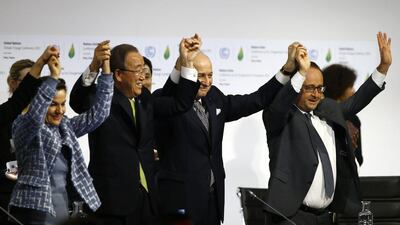PARIS // To rousing cheers and tears of relief, envoys from 195 nations approved an accord to stop global warming on Saturday, offering hope that humanity can avert catastrophic climate change and usher in an energy revolution.
French foreign minister Laurent Fabius ended nearly two weeks of gruelling UN negotiations in Paris with the bang of a gavel, marking consensus among the ministers, who stood for several minutes to clap and shout their joy.
“I see the room, I see the reaction is positive, I hear no objection. The Paris climate accord is adopted,” Mr Fabius said.
Turning to a little green hammer with which he formally gave life to the arduously-crafted pact, he said: “It may be a small gavel but it can do big things.”
The deal, to take effect from 2020, ends decades-long rows between rich and poor nations over how to carry out what will be a multi-trillion-dollar effort to cap global warming and deal with consequences already occurring.
“We are pretty happy as the UAE with this proposed deal because we were able to achieve all our goals in terms of the negotiations and what we wanted to see in the deal,” said Majid Al Suwaidi, lead climate change negotiator for the UAE. “In the long run, it sort of falls in line with the strategy that we already have in the UAE.”
The crux of the fight to limit global warming requires cutting back or eliminating the use of coal, oil and gas for energy, which has largely powered prosperity since the Industrial Revolution began in the 1700s.
The burning of those fossil fuels releases invisible greenhouse gases, which cause the planet to warm and change Earth’s delicate climate system.
The Paris accord sets a target of limiting warming of the planet to “well below” 2ºC compared with the Industrial Revolution, while aiming for an even more ambitious goal of 1.5ºC.
To do so, the emissions of greenhouse gases will need to peak “as soon as possible”, followed by rapid reductions, the agreement states.
The world has already warmed almost 1ºC, which has caused major problems for many people around the world particularly in developing countries, such as more severe storms, droughts and rising seas, according to scientists.
Environment groups said the Paris agreement was a turning point in history and spelt the demise of the fossil fuel industry.
Mr Al Suwaidi said the UAE had already been taking a proactive approach toward energy efficiency, climate change and emissions issues over the past several years as part of the country’s economic diversification plans.
“We were looking for recognition of the challenges that we face as countries that are dependent on fossil fuels,” said Mr Al Suwaidi. “So we wanted that to be recognised in the agreement as part of our country’s efforts. At the moment, it seems that we have that in the agreement, which is a big success for us as a team for something that we really wanted to see.
“We were also a country that was keen to have a legally binding outcome that meant that every country was taking action to address climate change because you know as a country we will be impacted by the effects of climate change in a number of ways both in terms of temperature and the effects domestically, but also in other issues like food security and regional stability and all of those issues that are affected by climate change,” said Mr Al Suwaidi.
The UAE achieved “a significant impact” on the negotiations, Mr Al Suwaidi.
“It’s a very exciting outcome. We were central in solving some of the problems in particular session and for a country of our size we were very effective as a team, so, a lot to be proud of as a delegation to the conference.”
Adoption of the accord required approval from the G77 bloc of 134 developing nations, of which the UAE is a member.
“We are united, all together. We are happy to go home with this text,” said Nozipho Mxakato-Diseko, a South African negotiator and spokeswoman for the G77, the biggest bloc in the UN climate forum.
Developing nations had insisted rich countries must shoulder the lion’s share of responsibility for tackling climate change as they emitted most of the greenhouse gases since the Industrial Revolution.
The United States and other rich nations countered that emerging giants must also do more, arguing developing countries now account for most of current emissions and thus will be largely responsible for future warming.
On the crucial financing issue, developing countries agreed to muster at least US$100 billion (Dh367.3bn) a year from 2020 to help developing nations.
However, following US objections, it was not included in the legally binding section of the deal.
Ahead of the talks, most nations submitted voluntary plans to curb greenhouse gas emissions from 2020, a process widely hailed as an important platform for success.
But scientists say that, even if the pledges were fully honoured, Earth would be on track for warming far above safe limits.
In an effort to encourage countries to improve their ambitions, the agreement will have five-yearly of their pledges starting from 2023.
Nations most vulnerable to climate change lobbied hard for wording in the Paris pact to limit warming to 1.5ºC.
Big polluters, such as China, India and Saudi Arabia, preferred a ceiling of 2ºC, which would have enabled them to burn fossil fuels for longer.
Nicholas Stern, a former chief economist for the World Bank who has become a prominent global advocate of climate action, hailed the deal.
“This is a historic moment, not just for us and our world today, but for our children, our grandchildren and future generations,” he said.
“The Paris Agreement is a turning point in the world’s fight against unmanaged climate change, which threatens prosperity and well-being among both rich and poor countries.”
* With reporting from Roberta Pennington, Associated Press, Agence France-Presse and Reuters

